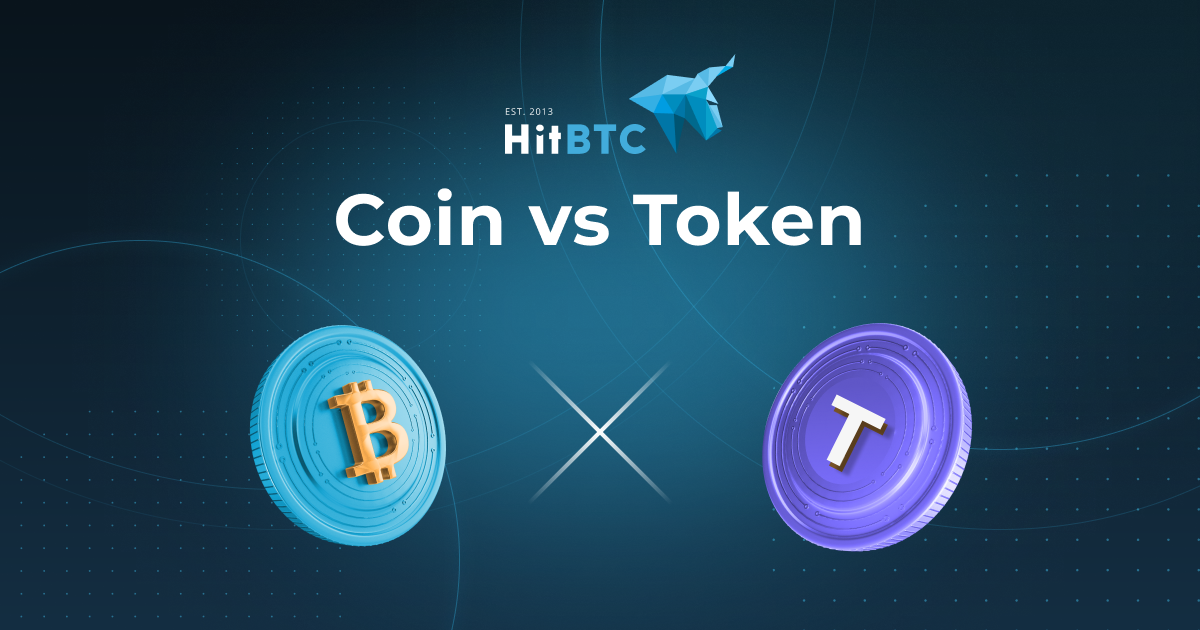What is a token, coin and how do they differ

When it comes to using the terms “coin” and “token”, for some people, these concepts are almost the same. Although they are fundamentally very similar, there is still a key difference. Let’s figure out how a token differs from a coin in cryptocurrencies.
Differences between tokens and coins
The main difference that is always in sight is the lack of its own blockchain, a token doesn’t have one. Rather, it runs and functions on an existing platform. The most popular token platform is Ethereum (ETH), created by Vitalik Buterin who initially aimed to make it convenient for users to create their own projects on an existing blockchain.
There are other fundamental differences between tokens and coins which include:
- Work-based on smart contracts. Tokens function with the help of programs that are running on the blockchain. They are called "smart" contracts. The functionality of tokens depends entirely on the capabilities that are embedded in smart contracts by developers. In each blockchain, tokens meet a certain standard to ensure compatibility with wallets and services on exchanges. The most common standard is ERC-20.
- The ability to work on multiple blockchains. A token does not necessarily have to work on a single platform. Cryptocurrency can function on several blockchains at once. A striking example of such a solution is the USDT stablecoin which is available on the Omni Layer of Bitcoin, Ether, Solana, and Tron.
- The possibility of changing the owner. For a token, the changing of the asset’s owner can be carried out on the blockchain. NFTs allow such functions. These are non-interchangeable, that is, unique tokens. They can be sold and bought. Therefore, NFTs are used as a way to certify ownership of virtual or tangible assets.
- Availability of additional functions. Tokens can perform additional actions laid down in a smart contract. Therefore, they are not just money, but a necessary component of a certain project. Coins, however, are only suitable for settlements with each other (in the virtual world).
- The usefulness of a project for it’s users depends on how many functions the tokens have and what tasks they perform. The more popular tokens are, the more they will be bought on the exchange or by the exchanges/platforms themselves. As a result, the exchange rate will increase, that is, the investor will receive the profit they’re seeking.
A token will become a currency only if it gets, for example, on a crypto exchange.
In other words, tokens are a unit of account with a function in the digital world — something like a digital receipt from the creator of the token that they undertake to give you something.
Tokens can be compared to food stamps that are issued and accepted only in a particular canteen: they may have value in it or nearby, but they will not be accepted in other restaurants. Only, in reality, such a canteen might be a cloud data storage with special functions, where the more tokens you have, the more disk space is available.
According to their purpose, there are several types of tokens:
Payment tokens. They are used as a means for calculations.
Service tokens. They are issued as a unit of calculation within a certain community (platform).
Exchange tokens. They are used as fuel for conducting exchange operations and bring additional bonuses, discounts, and dividends to traders.
DeFi tokens (suggestion) form part of an independent financial ecosystem where users can interact without the involvement of a third party.
Application Tokens (App Coins).
Stablecoins.
Non-interchangeable tokens.
For example, the HitBTC token (HIT) is a service token of the crypto trading platform. Its holders receive discounts on trading fees, low commissions for trading pairs on the exchange, and other benefits.
In addition to the fact that the HitBTC crypto exchange has its own token, there are more than 800 exchange pairs - tokens and coins of all kinds which can be bought and exchanged on the website or in the HitBTC App.
Coins
Coins are digital currencies that run on their own blockchains. A coin’s main characteristics are as a unit of payment, a means of exchange, and that it has it’s own value. A coin does not require any other platform for it’s work, - an example is Bitcoin (BTC), which is the native currency on its blockchain.
Thus, the coins:
- have their own blockchain. Only users of this network can perform actions with the coins.
- perform the function of money. In addition to transferring funds between users of the blockchain network, coins can be withdrawn to the usual fiat money.
- they have a high level of security. To prevent leakage, individual encryption algorithms are used.
Tokens do not have their platform, but function on the blockchains of other cryptocurrencies, therefore they are dependent. For example, a large number of tokens work on the Ethereum blockchain: OMG, AAVE, GALA, and others.
Final Thoughts
The main difference between coins and tokens is that coins work on their own independent blockchain, whereas tokens are created based on an existing one.
Most tokens are created to gain access to smart contracts and dApps, but they can also be used as shares, votes, and ownership certificates. They are usually generated during crowdfunding (ICO/ST). Crypto coins are a digital means of payment and are generated through mining or staking.
Сrypto wallet App
The HitBTC crypto wallet is a free and simple solution for beginners.
Fees and Limits update
We have recently updated our fees and limits. For the latest updates, please visit the fees and limits section on our website here.
HitBTC Mobile App
Don’t forget that you can trade on our platform from your mobile device. Start today by downloading the HitBTC App on Android and iOS.
